What Stays With Us
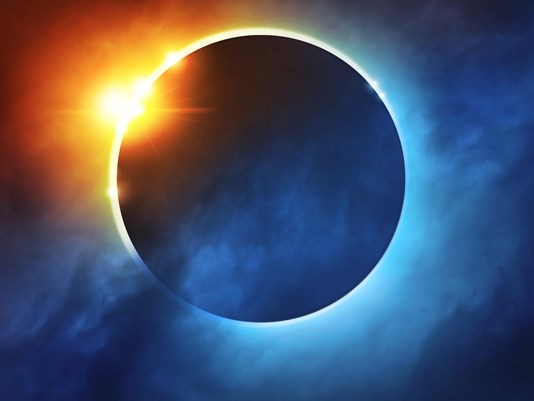 Back in the days when I had a prestigious corporate job and therefore lots of disposable income (as well as the nagging sense that somehow even that was not the “it” I had thought it would be), I happened to read Annie Dillard’s account of her experience during a total eclipse of the sun, and right then I started making plans to travel to wherever I needed to go to be able to see it for myself (which, at the time, was somewhere in Europe). But then things happened and I couldn’t go, and then other things happened and I couldn’t go again (I think the eclipse was in Hawaii that time), and then more things happened and finally I stopped being in a financial position to be able to do stuff like that.
Back in the days when I had a prestigious corporate job and therefore lots of disposable income (as well as the nagging sense that somehow even that was not the “it” I had thought it would be), I happened to read Annie Dillard’s account of her experience during a total eclipse of the sun, and right then I started making plans to travel to wherever I needed to go to be able to see it for myself (which, at the time, was somewhere in Europe). But then things happened and I couldn’t go, and then other things happened and I couldn’t go again (I think the eclipse was in Hawaii that time), and then more things happened and finally I stopped being in a financial position to be able to do stuff like that.
But I never forgot what Annie Dillard wrote.
And now, the eclipse is going to be happening right here where I live! Right over my house!
This time, I won’t miss it.
Here’s an except from Annie Dillard’s account:
“I had seen a partial eclipse in 1970. A partial eclipse is very interesting. It bears almost no relation to a total eclipse. Seeing a partial eclipse bears the same relation to seeing a total eclipse as kissing a man does to marrying him, or as flying in an airplane does to falling out of an airplane. Although the one experience precedes the other, it in no way prepares you for it. During a partial eclipse the sky does not darken–not even when 94 percent of the sun is hidden. Nor does the sun, seen colorless through protective devices, seem terribly strange. We have all seen a sliver of light in the sky; we have all seen the crescent moon by day. However, during a partial eclipse the air does indeed get cold, precisely as if someone were standing between you and the fire. And blackbirds do fly back to their roosts. I had seen a partial eclipse before, and here was another…
“What you see before your eyes is the sun going through phases. It gets narrower and narrower, as the waning moon does, and, like the ordinary moon, it travels alone in the simple sky. The sky is of course background. It does not appear to eat the sun; it is far behind the sun. The sun simply shaves away; gradually, you see less sun and more sky….
“The sky’s blue was deepening, but there was no darkness. The sun was a wide crescent, like a segment of tangerine. The wind freshened and blew steadily over the hill. The eastern hill across the highway grew dusky and sharp. The towns and orchards in the valley to the south were dissolving into the blue light. Only the thin river held a trickle of sun.
“Now the sky to the west deepened to indigo, a color never seen. A dark sky usually loses color. This was a saturated, deep indigo, up in the air. Stuck up into that unworldly sky was the cone of Mount Adams, and the alpenglow was upon it. The alpenglow is that red light of sunset which holds out on snowy mountaintops long after the valleys and tablelands are dimmed. ‘Look at Mount Adams,’ I said, and that was the last sane moment I remember.
“I turned back to the sun. It was going. The sun was going, and the world was wrong. The grasses were wrong; they were platinum. Their every detail of stem, head, and blade shone lightless and artificially distinct as an art photographer’s platinum print. This color never has been seen on earth. The hues were metallic; their finish was matte. The hillside was a nineteenth-century tinted photograph from which the tints had faded. All the people you see in the photograph, distinct and detailed as their faces look, are now dead. The sky was navy blue. My hands were silver. All the distant hills’ grasses were finespun metal which the wind laid down. I was watching a faded color print of a movie filmed in the Middle Ages; I was standing in it, by some mistake. I was standing in a movie of hillside grasses filmed in the Middle Ages. I missed my own century, the people I know, and the real light of day…
“People on all the hillsides, including, I think, myself, screamed when the black body of the moon detached from the sky and rolled over the sun. But something else was happening at the same instant, and it was this, I believe, which made us scream.
“The second before the sun went out we saw a wall of dark shadow come speeding at us. We no sooner saw it than it was upon us, like thunder. It roared up the valley. It slammed our hill and knocked us out. It was the monstrous swift shadow cone of the moon. I have since read that this wave of shadow moves 1,800 miles an hour. Language can give no sense of this sort of speed–1,800 miles an hour. It was 195 miles wide. No end was in sight–you saw only the edge. It rolled at you across the land at 1,800 miles an hour, hauling darkness like plague behind it….
“Less than two minutes later, when the sun emerged, the trailing edge of the shadow cone sped away. It coursed down our hill and raced eastward over the plain, faster than the eye could believe; it swept over the plain and dropped over the planet’s rim in a twinkling. It had clobbered us, and now it roared away. We blinked in the light. It was as though an enormous, loping god in the sky had reached down and slapped the earth’s face….
“When the sun appeared as a blinding bead on the ring’s side, the eclipse was over. The black lens cover appeared again, backlighted, and slid away. At once the yellow light made the sky blue again; the black lid dissolved and vanished. The real world began there. I remember now: we all hurried away. We were born and bored at one stroke. We rushed down the hill. We found our car; we saw the other people streaming down the hillsides; we joined the highway traffic and drove away.
“We never looked back. It was a general vamoose, and an odd one, for when we left the hill, the sun was still partially eclipsed–a sight rare enough, and one which, in itself, we would probably have driven five hours to see. But enough is enough. One turns at last even from glory itself with a sigh of relief. From the depths of mystery, and even from the heights of splendor, we bounce back and hurry for the latitudes of home.”
It’s Wild
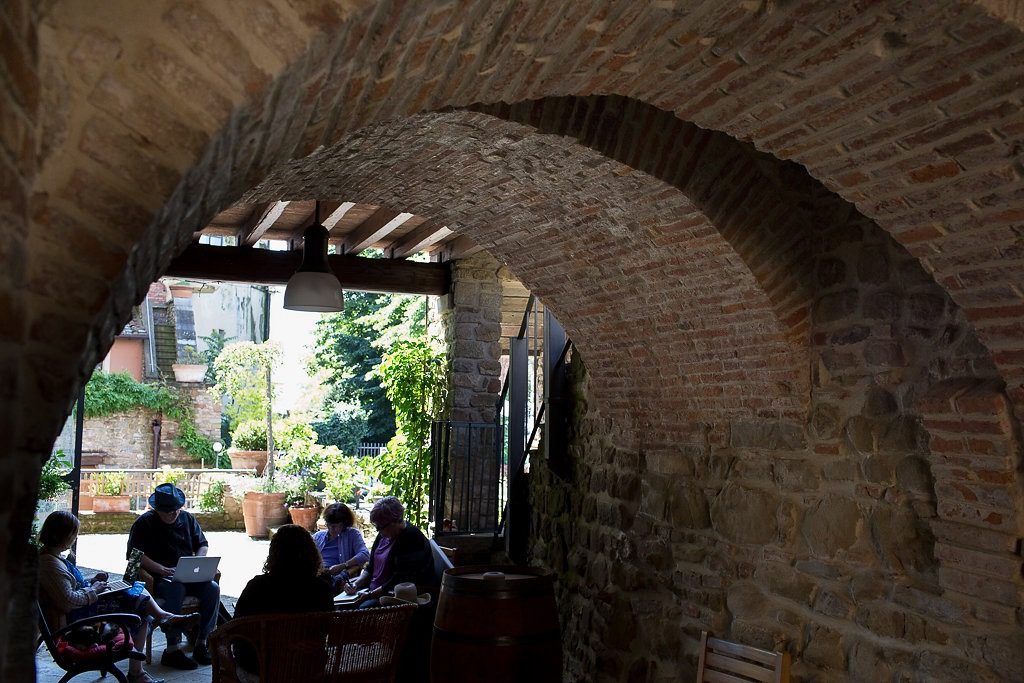 NOTE: I’m scheduled for jury duty every day next week. Last time they let me go home after the first day, which I am hoping they will do this time too. If they do, I’ll post again on Tuesday. If not, I’ll post as soon as I can. Stay tuned.
NOTE: I’m scheduled for jury duty every day next week. Last time they let me go home after the first day, which I am hoping they will do this time too. If they do, I’ll post again on Tuesday. If not, I’ll post as soon as I can. Stay tuned.
***
For today, one last prompt from the writing workshop: “Let the creative process speak.” Here’s what I wrote:
Me: I love you.
Creative Process: Thanks! I love you too.
Me: OK. Good. Now what?
Creative Process: I don’t know. I guess we move in together or something.
Me: Wait. This is too easy.
Creative Process: Sweetheart, don’t worry. We’ve done the hard stuff. We saw the bear. We let him off the chain and yeah, he broke a few chairs and tore up the wallpaper, but he settled down, didn’t he?
Me: He’s still wild.
Creative Process: Yeah. I know. I threw the chain away. I let him run off into the hills and I said it was OK if he never came back–I’d miss him, of course, but it was no good to try to keep him–and that was all he needed because he hasn’t stayed away. He doesn’t come into the house anymore, but that’s because he’s too big, the furniture doesn’t fit him, and the rug makes him itch.
So he stays in the woods with the other wild things–and he marks a trail with his claws–so I can follow him. He draws me out of the house when the moon is dark and I follow the path that’s not really a path, more of a whisper that runs through the bushes. I follow the sound like a scent, which recedes, taking me deeper and deeper into silence. Sometimes I hear a snort, or the crash when he lumbers, rears up, then drops back down to earth.
But sometimes I hear nothing. That’s when the stillness condenses, turns liquid, forms a pool that deepens and darkens until creatures who never before existed begin to rise up, shining from within, luminous, phosphorescent, shimmering and trembling with awareness.
***
(photo by Kyoko Ide)
Arriving
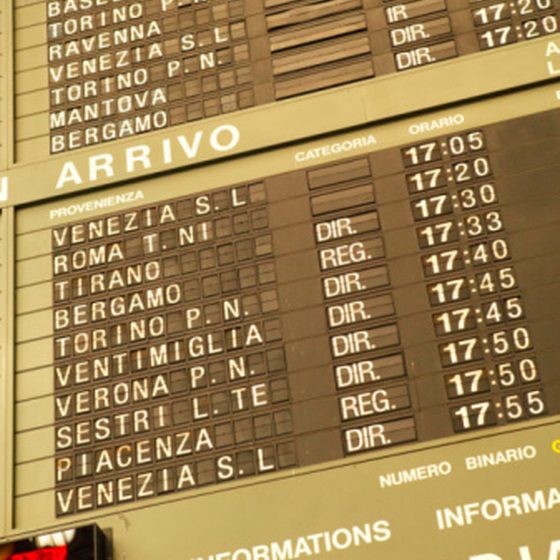 One more prompt from the workshop: “Write about arriving.”
One more prompt from the workshop: “Write about arriving.”
Here’s what I wrote:
It’s colder here than I had expected and I’m worried that I brought all the wrong clothes. I should have brought that sweater I almost packed at the last minute, it would have been perfect, not too warm, but cozy, and it was loose, a little over-sized, so I could have worn it over anything. Even that stupid t-shirt with the Nietzsche quote in Italian — geez, that’s so pretentious, what was I thinking! I’m always buying stuff like that. I see it and I think it’s so cool and I’ve got to have it, and then I get it home and it looks so stupid. Plus it doesn’t even fit! The sleeves are too tight and the neck kind of sags. Why can’t they make t-shirts that fit? They’re always bunching up, and the hems–why do the hems always roll up at the bottom like that?
“Come back the the present moment,” the instructor says.
And then I’m back.
Where is the Border?
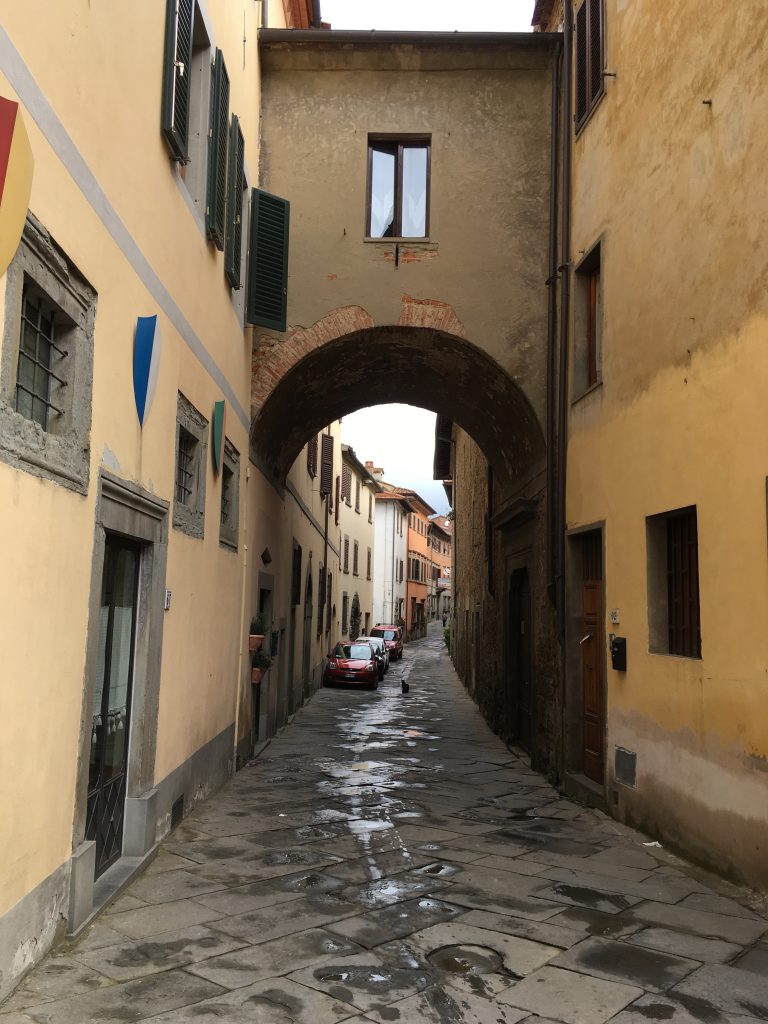 Another of the workshop prompts: “Take a walk; look around; write what you see.”
Another of the workshop prompts: “Take a walk; look around; write what you see.”
Here’s what I wrote:
The wall in the sun is warm, but the stone of the steps where I sit in the shade is cool and not exactly wet but not exactly dry either, so my thighs and my buttocks–where they rest on the stone–are becoming chilled…the warmth of my skin, of the blood rushing just below the surface, is giving itself over to the stone, is taking on the cold and the damp, an exchange no less intimate than a lingering kiss.
Is there really an “outside” and an “in”?
I don’t think so.
Where is the border between the heat of my body and the cool of the stone? Skin is porous. So is stone.
Everything is.
My pulse quickens as a car comes too close. The hairs on my arms stand erect. That car has not touched me–or maybe it has. I am changed as a result of the encounter. There are diesel fumes now in my lungs. The out-breath of combustion leaves grit on lips.
That car, too, and its driver have been touched by my presence. By the milky exhaust of my exhalation. By the dust of my skin cells I am constantly shedding. By the bite of my sweat tinged with garlic and salt.
Where is the line that marks the boundary between us? Where are the guards with their crossbars and fences?
There is no me that is not touched by you. There is no you that does not bleed into me.
***
(photo by me!)
What I’m Talking About
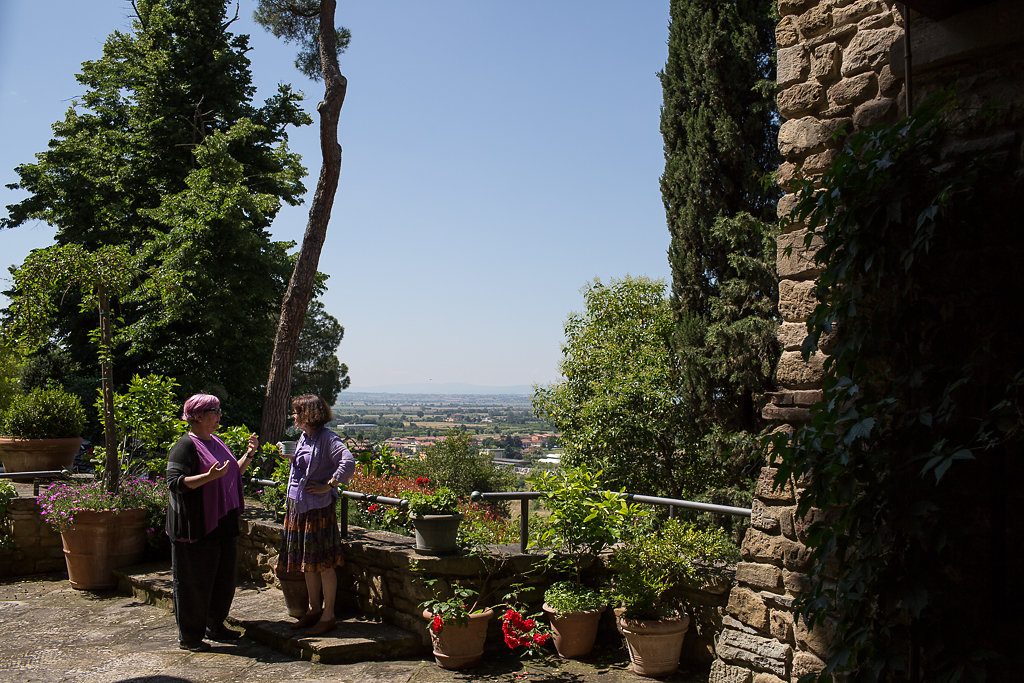 At the writing workshop there were lots of different “prompts” that we wrote from. Prompts like: “Start with the word Consequently” or “Write a dialogue between you and your ‘Muse'” or “Write a ‘Dear John’ letter using only one-syllable words.” Some of the prompts were more inspiring than others, but they were all fun.
At the writing workshop there were lots of different “prompts” that we wrote from. Prompts like: “Start with the word Consequently” or “Write a dialogue between you and your ‘Muse'” or “Write a ‘Dear John’ letter using only one-syllable words.” Some of the prompts were more inspiring than others, but they were all fun.
After a while I noticed that no matter what the prompt was, what I wrote almost always came out as some kind of Dharma talk! I’m not sure if that’s a “good” thing, but I think it says a lot about what’s on my mind…what I give my attention to…these days.
One of the prompts was: “What matters?”
Here’s what I wrote:
What matters is not the weather. Not the food. Not the language you speak. What accent. What vocabulary.
Well, OK, all of that matters in some sense. In terms of what you can or can not do. In terms of pleasant or unpleasant. Comfort. Physical ease.
But that doesn’t matter. Not really.
What matters is peace of mind.
What matters is the ability to be in any situation, any circumstances, any country or location or station in life and still be at ease.
How is this possible, you ask? Isn’t there some level of safety, of connection, of satisfaction that’s required for the mind to be at ease?
No.
Ultimately there is no security. No safety. Everything changes. There is always the unpleasant. There is always aging and sickness. And death. It is only the wanting of things to be different than they are that interferes with the peace and ease of mind I am talking about.
Pain is unpleasant. Loss is unpleasant. Disappointment is unpleasant. But it is possible to be at ease with that which is unpleasant.
It is possible.
In fact, it is necessary.
The only alternative is to always be reacting against the existence–or the possible arrival–of something unpleasant. To always be trying to hold onto whatever is pleasant–and, oh yes!, there is so much that is pleasant–but it is useless to hold on. Useless to try to have only the things that are pleasant. Useless to try to protect or defend against the loss of the pleasant.
What matters is the delight and enjoyment of whatever is pleasant, and the ability to acknowledge–to allow for the existence of–whatever is unpleasant. To respond, of course, with whatever is needed. But then to allow it all…both the pleasant and the unpleasant…to arise and pass away. As it will. As it must.
It’s only natural.
No need to fight it.
Is it not more easeful to live in accordance with that which is natural? Is there ever any use in raging against nature? Does it help to fight gravity?
So it is with the natural experience of pleasant and unpleasant. Both arise. Both pass away.
In the presence of this, there is peace.
***
(photo by Kyoko Ide)
I Come From….
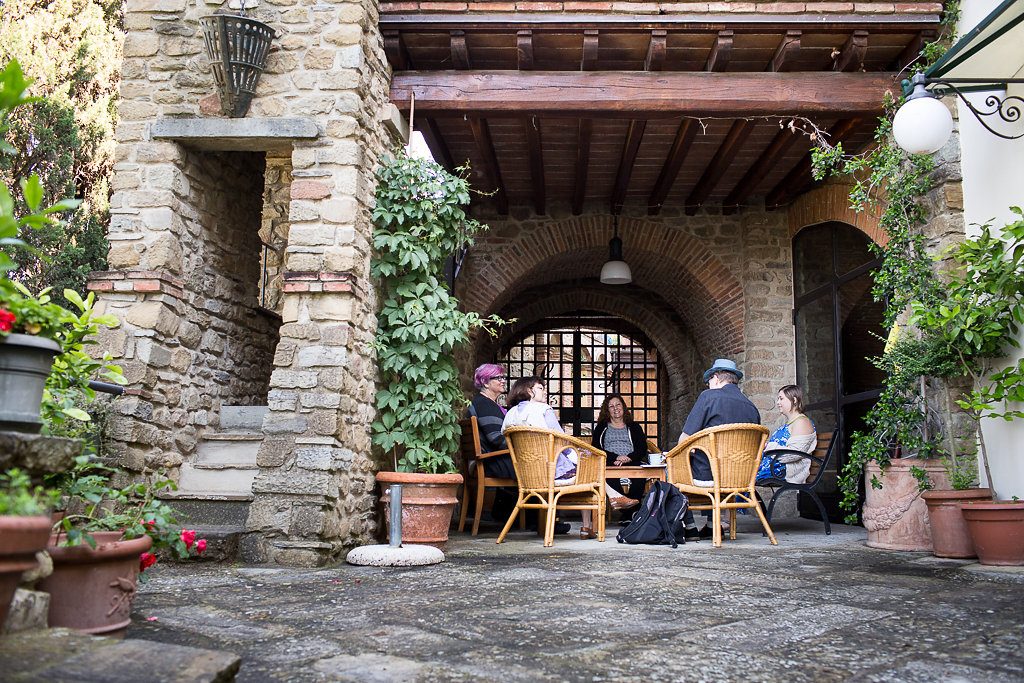 As most of you know, I’ve been at this little writing workshop in Italy, taught by a friend of mine — Cary Tennis — who now lives there. (The photo is of us at the workshop… Cary’s the one with the blue hat and I’m the one with the purple hair.)
As most of you know, I’ve been at this little writing workshop in Italy, taught by a friend of mine — Cary Tennis — who now lives there. (The photo is of us at the workshop… Cary’s the one with the blue hat and I’m the one with the purple hair.)
The workshop is really just a chance to practice writing, in a group, in a beautiful location. The way it works is the leader gives a “prompt” and then we all write whatever comes into our mind in response to that prompt…for about 20 minutes, usually…then we read what we’re written aloud to the group (or not). Then there’s another prompt and we do it all over again.
The first prompt was: Begin with “I come from….”
Here’s what I wrote:
I come from happiness. Where else could I come from and still be alive? But why did I leave? Maybe I left happiness thinking — foolishly — that happiness was too simple, too tranquil, too uninteresting to give flavor and excitement to a life.
Maybe I went looking for conflict, to try to prove myself worthy of this happiness that had been given to me, this aliveness, this thing that I had not asked for, had not worked for, had not suffered for….and so thought it was not precious enough to honor by simply receiving, simply accepting, simply enjoying!
Maybe I went looking for happiness, not recognizing that happiness was the very air I was breathing, thinking instead that I needed something denser, more substantial, something I could hold in my hand or bite down on, something I could drink or swallow, or maybe drown in.
Maybe I couldn’t taste this happiness, this birthright, because its sweetness was too subtle. Maybe sourness called out to me. Maybe bitterness, saltiness, while the sweetness waited patiently, knowingly — lovingly — for the hunger to subside.
For some, I know, there is always the hunger.
That is what sadness is. That hunger. That thirsting. That longing for a taste of something…but never knowing what that something is.
Happiness is knowing. It is breathing. It is tasting whatever there is to taste. Letting the flavor arise. Then letting it pass. As it will. As it must. And then breathing again. Living. And knowing. And breathing again.
***
(photo by Kyoko Ide)
Reading about Wanting
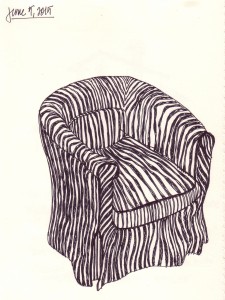 Here is a drawing I made of the chair in my room in Castiglion Fiorentino, where I sat to read the book I’d brought for literary inspiration: The Folded Clock, by Heidi Julavits. I thought I’d be inspired because it got rave reviews in the New York Times, and because the structure of the book is both mundane (it’s a diary) and yet it’s not (there’s no discernible order). Each entry starts with a date, which seems to have no chronological connection to the entry before, and with a sentence that begins, “Today…”
Here is a drawing I made of the chair in my room in Castiglion Fiorentino, where I sat to read the book I’d brought for literary inspiration: The Folded Clock, by Heidi Julavits. I thought I’d be inspired because it got rave reviews in the New York Times, and because the structure of the book is both mundane (it’s a diary) and yet it’s not (there’s no discernible order). Each entry starts with a date, which seems to have no chronological connection to the entry before, and with a sentence that begins, “Today…”
For example:
May 5. Today I met for lunch a famous German artist, the one who violates the homes of others with her personal possessions.
August 30: Today we climbed Blue Hill.
June 8. Today I flew home from Italy after living for a month with a ghost.
So you can see, this is no ordinary diary.
From a literary point of view, it was very inspiring. From a personal point of view, it was mostly disheartening.
On August 16, she writes about wanting. The entry begins: Today I browsed for skirt suits online. She ends with a beautifully written riff on wanting, which I think captures something of the delusion that keeps her (and others) forever looking for SOMETHING, always anxious, unsettled, and unhappy:
“I recalled being a kid and my mom taking me to a plant nursery called Skillins. I hated Skillins. As a child I was gifted at finding objects to desire. To take me to basically any store was to court my begging for items I had no business wanting. It was desire for the sake of desire. The plant nursery, however, confounded my meta-desire mechanism. I tried and tried, but I could never find a single thing to desire at Skillins, not even in the room with the ceramic frog planters. I didn’t want anything, and because I didn’t want anything, Skillins made me anxious. In Skillins I experienced what it was to desperately want to want something, and to find nothing to want. Even as a kid, this struck me as the worst possible way to feel. I sometimes think this is why I became a writer. Here was a way to regularly exercise my desire. I could desire to do this thing that no one does perfectly, and by doing it and doing it I could learn how to desire more, and better. Here was an activity that would always leave me wanting. When I want something–that to me is not youth exactly, but the opposite of death. That to me is a way to always feel like I am nowhere near the end.”
This is What I Know About Wanting
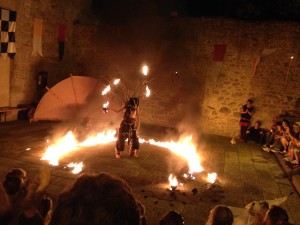 This is a photo I took during the Medieval Festival that started the first night I arrived in Castiglion Fiorentino.
This is a photo I took during the Medieval Festival that started the first night I arrived in Castiglion Fiorentino.
And this is what I wrote the first week in response to the prompt: “Write about wanting something.”
(Note: The following is a work of fiction. This doesn’t mean it’s not true. Just that it’s not strictly autobiographical.)
This is what I know about wanting: it is painful. It is painful to feel the lack of something. And it is delusional to think that getting the something you want will relieve that pain. It won’t. There will be a moment, an instant, of pleasure in the getting, but then there will be the wanting of more. The wanting to keep what has been gotten. The wanting that turns into the fear of losing what one has. There is pain in that fear. And then sooner or later, the additional pain of the actual losing. Because sooner or later — and usually sooner than later — you will lose what you had. At the very least, it will become other than what it was. What was exciting becomes boring. What was new becomes old. What was interesting becomes tedious. Inevitably, what was wanted becomes something other than that. And then there is the wanting to get rid of it. The wanting of something new to replace what is now old, and so again, and on and on, there is still more wanting…and there is pain in that.
I wanted her to want me.
I wanted her hands in my hair and her mouth on my neck. I wanted the weight of her body. The salt. And the sweat.
And I got it. I got it all.
The heat and the musk and the teeth and the rest.
It was sweet.
But sweet like honey on the edge of a razor.
There is no resting there.
Only danger.
And wanting.
And the pain that comes with that.
I Am From…
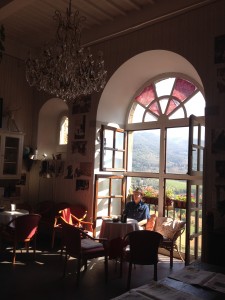 Here is a photo of my favorite spot, in my favorite cafe, in my now-favorite town in Tuscany (Castiglion Fiorentino). And here’s what I wrote, in this favorite place, in response to the prompt: “I am from…..”
Here is a photo of my favorite spot, in my favorite cafe, in my now-favorite town in Tuscany (Castiglion Fiorentino). And here’s what I wrote, in this favorite place, in response to the prompt: “I am from…..”
I am from here. That’s not exactly, literally true, but it feels true. I feel I belong here. Isn’t that what we mean when we say where we’re from? But I’m also from “home.” By which I mean that I am from my past. But where is my past? How far is it from here? And where did it come from?
We are stardust, they say. We are carbon and arsenic and gold. We are earth.
And air.
And water.
And fire.
These, I am from. And to these I will return.
But who is this “I”?
A word, written on paper.
A thought, born in the mind?
Yes.
And no.
Because surely I am more.
What is a word? What is a thought?
Are these, too, made of stardust?
What about dreams? Where do they come from?
If the stars could dream, would they dream about us?
Does the moon dream of water?
Does the sun dream of air?
What is gravity, after all, but the longing of dust for stones?
And what about poetry?
Isn’t it poetry that sings the songs of our dreams?
What wakes us up?
Not the pull of the earth.
Or the call of the stars.
It’s the questions we ask.
And the light that this brings.
Being. Hearing.
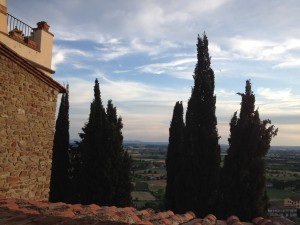 Here is a photo taken at Le Santucce, the former convent in Castiglion Fiorentino, where the writing workshops were held. And here is a sample of the writing I did on the balcony there, in response to this prompt: “Be where you are and write what you notice.”
Here is a photo taken at Le Santucce, the former convent in Castiglion Fiorentino, where the writing workshops were held. And here is a sample of the writing I did on the balcony there, in response to this prompt: “Be where you are and write what you notice.”
The ringing of bells.
The swoosh and roar, pause, then buzz of unseen traffic.
Birds.
A crescendo, now, of tires-on-pavement.
Insects.
More bells.
Motorcycle.
And now a racket of birds.
Insects: whine, snap, whiz, crackle.
Then more of the swoosh and swipe of cars on the road. And behind it all: birds.
The sputter of another motor.
More birds again: coo-ing and who-ing.
A cat appears. Soundless.
Then the sizzle of cicadas.
And now the buzz of my own blood as it sings behind my ears.
All these sounds, rising and falling, pausing, overlapping, punctuated one with another. And then a wash of sounds, points of sound — a dog barks, someone shouts somewhere in the hills — then the droning continues, rises again, some kind of machinery starts up, then desists, a sputter, then bird song — a bee startles by — traffic noise takes the foreground, then shifts — sotto voce.
There is a high whine in the distance.
Metal-on-metal, then wood-striking-metal.
More birds.
Staccato of woodpecker.
Finches — soprano — insistent, triumphant at first, then alarmed.
Wrens scolding one another.
Something metallic shifts. A percussive exchange.
Cookware.
Teacups and saucers.
A coda of train in the distance.
Then the chorus again: woodpecker and truck-rush, motorcycle, warble and tweeting, clicks, footsteps (canvas on stone), a car honks, that motor again (closer this time)…buzzing and humming, growling, then puttering, idling, then high and angry, then silent.
But the silence is never silent.
Or haven’t you heard?
